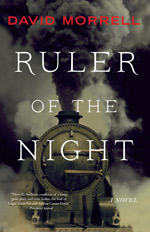 “Ruler of the Night,” by David Morrell
“Ruler of the Night,” by David Morrell
(Mulholland Books, pp 342, $27.00)
If you go down the street and ask anyone who David Morrell is chances are you will be met with blank stares. And yet, there is not a soul on earth who does not know “Rambo,” the iconic character Morrell created more than 45 years ago. In “Ruler of the Night,” Morrell spruces up another dormant icon of the 19th century British literature, the troubled soul, Thomas de Quincey, here turned detective. De Quincey has remained on bookstores’ shelves through the ages for writing “Confessions of an Opium-Eater,” a substance, which himself relied on to soothe his aching existence. Quite à propos in our age of cannabis legalization.
“Ruler of the Night” is first and foremost a locked-room mystery, where a crime is committed in a train compartment even though no one, but the victim, has access to it. The setup reminds at once of Agatha Christie’s Orient Express. But here, de Quincey happens to be in the train when the crime occurs, and he sets up to find the murderer. Unlike in Christie’s, the “Ruler of the Night” carries a strong metaphor. It is not simply the darkness of the murderer. The title also evokes the monstrous machine that de Quincey perceives as a degradation of humanity. The invention of the train itself, which was to transform the fabric of societies beyond recognition, redefining time and the shrinking notion of space, which ultimately, by extension, gave rise to the British Empire. An achievement accomplished not without substantial numbers of victims along the way.
The attraction, beside the plot, here is the prose itself. More layered than many of his peers’, Morrell’s prose tastes of crimson velvet and blood. It carries the whiffs of the inescapable texture of Victorian era when the most horrific murders took place with disarming realism. One can touch both Baudelaire’s flâneur who wanders aimless through the streets of Paris, and E. A. Poe’s bedroom drama in the “Purloin Letter.” The novel, the plot and its prose . . . will turn you into an addict, even against your will.
